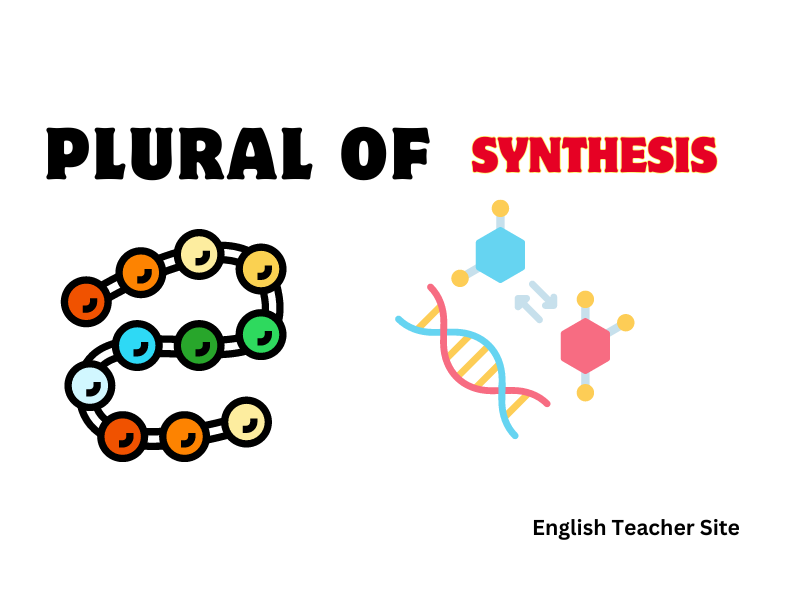What’s the Plural of Synthesis: Understanding Singular and Plural Forms in English

- The noun “synthesis” has Greek origins and is used across various disciplines to describe the combination of elements into a unified entity.
- The plural form of “synthesis” follows Greek language rules, differing from regular English pluralization patterns.
- Recognizing and applying the correct plural form of words like “synthesis” improves language accuracy and clarity.
It’s fascinating to observe how certain nouns transform from singular to plural. The word “synthesis” is an intriguing case. It originates from the Greek “synthesis,” which means “to put together,” reflecting the action of combining different elements to create a cohesive whole. In the world of chemistry, synthesis refers to the process of creating complex substances from simpler ones. But it’s not just science that utilizes this concept; synthesis is a key principle in philosophy and other fields where it denotes the combination of ideas to form a theory or system.
Is Synthesis Singular or Plural?
Singular Form:
“Synthesis” is singular when referring to a single instance of combination or creation. For example, one might say, “The scientist achieved a remarkable synthesis of the two compounds.”
| Singular Usage | Example Sentence |
|---|---|
| Synthesis | The synthesis of the chemical elements created a new compound |
Plural Form:
The plural form of “synthesis” is “syntheses.” This form is applicable when discussing multiple instances or types of combinations or creations. Usage of the plural form can be observed in sentences such as, “Several syntheses of data were required to arrive at a conclusive result.”
| Plural Usage | Example Sentence |
|---|---|
| Syntheses | The various syntheses of ideas led to an innovative design |
- Singular: “synthesis”
- Plural: “syntheses”
Definition of Synthesis/Syntheses
Synthesis refers to the process of combining multiple elements into a unified entity. This can involve the merging of concepts in a theoretical framework or the chemical amalgamation of elements into a compound. The word originates from the Greek ‘synthesis’, meaning ‘to put together’.
Plurality in English Nouns
| Singular | Plural |
|---|---|
| Synthesis | Syntheses |
Plural Form: Syntheses
The plural of synthesis, ‘syntheses’, is less straightforward. It follows the rule for certain nouns ending in ‘is’, where the ‘is’ is replaced by ‘es’ to form the plural version. This pattern is seen in other nouns like ‘thesis’ and ‘theses’.
- Singular: synthesis
- Plural: syntheses
Usage Examples in Sentences
- In chemistry, multiple syntheses of a compound may be required to achieve purity.
- The author’s syntheses of historical facts provided various insightful perspectives.
What’s the Plural of Synthesis?
Regular vs. Irregular Plurals
Words typically form their plurals by adding an -s or -es. However, synthesis belongs to a category of nouns that form their plurals irregularly. To understand this, it is useful to examine both its singular and plural forms.
| Singular Form | Plural Form |
|---|---|
| synthesis | syntheses |
Countable vs. Uncountable
Nouns can be either countable or uncountable which affects their pluralization. “Synthesis” can serve as both countable and uncountable, making it versatile in usage. Here’s a breakdown:
- Countable: Refers to individual instances or examples of synthesis.
- Uncountable: Refers to synthesis as a general concept.
To further clarify when syntheses is used, the following can be observed:
- In scientific contexts, referencing various types of syntheses or a collection of syntheses.
- In more general contexts where the form stays as synthesis, such as when discussing the concept broadly without mentioning specific instances.
Nouns Ending in -sis/-ses
Below are two tables illustrating examples of this transformation along with their singular and plural forms:
Singular to Plural Transformations:
| Singular Form | Plural Form |
|---|---|
| Analysis | Analyses |
| Basis | Bases |
| Crisis | Crises |
| Diagnosis | Diagnoses |
| Hypothesis | Hypotheses |
| Thesis | Theses |
Examples in Sentences:
| Singular | Plural |
|---|---|
| The scientist presented a revolutionary synthesis. | The scholars discussed various syntheses of the data. |
| His analysis provided much-needed clarity on the subject. | The multiple analyses presented showed different perspectives. |
| The economic crisis is impacting global markets. | Several economic crises have shaped the current financial policies. |
| A hypothesis needs to be testable to be considered scientifically valid. | Many hypotheses were posed, but only a few withstood experimental scrutiny. |
In everyday communication:
- The doctor made a diagnosis based on the symptoms.
- The students presented their theses at the end of their graduate programs.
Examples of Synthesis Used in Context
Science and Chemistry: In these fields, “synthesis” refers to the combination of various chemicals to produce a new compound.
- Example: The laboratory synthesis of new medication aids in groundbreaking medical treatments.
Academic Writing: Here, “synthesis” involves integrating different ideas and studies to form a comprehensive analysis or argument.
- Example: Her essay presented a thoughtful synthesis of historical sources to examine the Civil Rights Movement.
Philosophy: In philosophical discourse, “synthesis” might be used to describe the combination of thesis and antithesis, leading to a new idea or “synthesis.”
- Example: Hegel’s dialectic involves a synthesis that resolves the conflict between thesis and antithesis.
To illustrate the plural usage, consider the following tables:
Occurrences of Synthesis in Scientific Research
| Single Use | Plural Use |
|---|---|
| The chemical synthesis was successful. | Multiple syntheses of the compound were needed. |
Instances in Literary Analysis
| Single Use | Plural Use |
|---|---|
| His synthesis of various characters’ viewpoints adds depth. | The novel offers numerous syntheses of reality and fiction. |
In languages and linguistics, “synthesis” might be used as follows:
- Linguists study the synthesis of new words into a language over time.
- Syntheses of linguistic theories often lead to new paradigms in understanding language acquisition.
Examples of Syntheses in Context
In Scientific Research
| Singular Form | Plural Form |
|---|---|
| A new synthesis | Several syntheses |
Examples:
- The lab was recognized for its groundbreaking synthesis of the new compound.
- The journal published multiple syntheses that presented different approaches to organic molecule creation.
In Literary Analysis
| Singular Use | Plural Use |
|---|---|
| The synthesis of themes in the novel | The syntheses of themes across the genre |
Examples:
- The synthesis of mystery and romance genres is skillful in her latest novel.
- Scholars debated the various syntheses of realism and fantasy in early 20th-century literature.
In Education and Learning
- The teacher explained how the synthesis of historical events can lead to a deeper understanding of cultural development.
- Students were asked to compare different syntheses of philosophical theories.
In Policy and Debate
- Political analysts often seek a synthesis of various viewpoints to understand the spectrum of opinions.
- During the symposium, experts provided multiple syntheses on climate change policies.
Synonyms of Synthesis/Syntheses
Here are two tables categorizing synonyms based on general usage and specific disciplines:
General Usage
| Synonym | Context of Use |
|---|---|
| Combination | General; combining elements |
| Composition | General; forming a complex whole |
| Integration | General; bringing things together |
| Fusion | General; a blend of elements |
Specific Disciplines
| Synonym | Discipline |
|---|---|
| Amalgamation | Chemistry |
| Union | Mathematics |
| Convergence | Philosophy |
| Mixture | Science |
- Blending: to mix smoothly and inseparably together.
- Combining: to bring into or join in a close union.
- Merging: to cause to combine or coalesce; unite.
Synthesis and syntheses also have a strong presence in more technical fields, where the words conjure specific images and processes:
- In chemistry, synthesis refers to the process of creating a compound by combining simpler substances or the formation of substances from elements or simpler compounds.
- In philosophy, it often denotes the combination of ideas to form a theory or system.
Sources
My name is Khamis Maiouf. I am the creator of the English Teacher Site, dedicated to providing valuable resources and insights for students around the world. With a passion for education and a commitment to helping students enhance their skills, I aim to make English teaching more effective and enjoyable for both educators and students.






